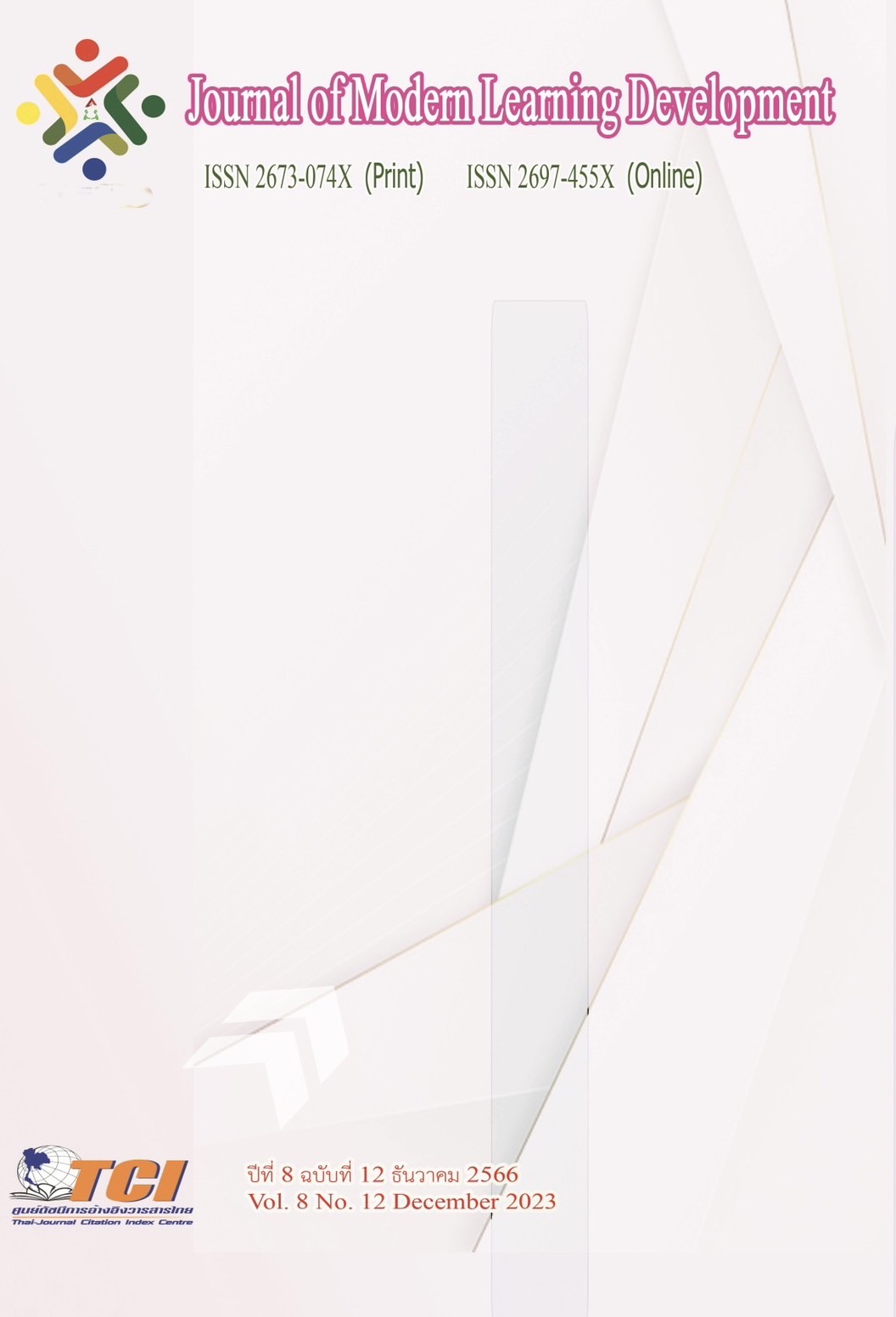The Development of Time Management Measurement For Graduate Students
Main Article Content
Abstract
This study aimed 1)to develop and determine the quality of time management measurement (TM) for graduate students and 2) to create local norms for time management measurement (TM) for graduate students. The sample included 658 first and second-year graduate students through multi-stage random sampling. The research instrument was time management measurement for graduate students as a behavioral measurement with 5 scales with 38 questions. Statistics for data analysis included mean, scatter coefficient, skewness, kurtosis, percentile, normally distributed standardized t-score, and confirmatory factor analysis. Data were analyzed using the SPSS for Windows, the Mplus program, and Microsoft Excel.
The findings were as follows: 1. As for time management measurement for graduate students developed by the researcher, 5 components included the realization of work objectives, time planning, plan implementation, time estimation, and time management improvement. There were 10 indicators: understanding the task, task goal setting, work schedule, prioritization of tasks, work implementation, dealing with problems and obstacles, following up on progress in implementation, problem analysis, corrective action in time management, and behavior modification with a total of 38 questions, the IOC of 0.60 - 1.00, the discrimination power of 0.42 - 0.78, and the reliability of 0.937. The measurement had construct validity (Chi-squared = 31.625, df = 22, p-value = 0.084, RMSEA = 0.045, CFI = 0.992, TLI = 0.984, and SRMR = 0.028) 2. The local norms of time management measurement for graduate students were divided into 4 levels: high time management with a score of 162 or higher (≥T57), quite high time management with a score from 152 to 161 (T50 – T56), moderate time management with a score from 139 to 151 (T42 – T49), and low time management with a score of fewer than 139 points (less than T42).
Article Details
References
ดิลกรัตน์ โคตรสุมาตย์. (2555). ปัจจัยที่ส่งผลต่อระยะเวลาการสำเร็จการศึกษาของนักศึกษาระดับ บัณฑิตศึกษา มหาวิทยาลัยขอนแก่น. วารสารศึกษาศาสตร์ ฉบับวิจัยบัณฑิตศึกษา มหาวิทยาลัยขอนแก่น, 5(3), 17-27.
นวรัตน์ ไวชมภู และคณะ. (2562). ความสามารถในการบริหารจัดการเวลาของนักศึกษาพยาบาล วิทยาลัยพยาบาลบรมราชชนนี ยะลา. วารสารวิชาการมหาวิทยาลัยอีสเทิร์นเอเชีย ฉบับสังคมศาสตร์
และมนุษยศาสตร์, 9(1), 296-306.
พรรณวดี สมกิตติกานนท์ และคณะ. (2560). การพัฒนารูปแบบการให้การปรึกษากลุ่มแบบบูรณาการเพื่อเสริมสร้าง
คุณลักษณะของความสำเร็จในการบริหารเวลาของนักศึกษาวิทยาลัยเซนต์หลุยส์. วารสารเกษมบัณฑิต, 18(1), 19-35.
พิมพ์ โหล่คำ. (2550). ความสามารถในการบริหารเวลาของนิสิตมหาวิทยาลัยศรีนครินทรวิโรฒ [วิทยานิพนธ์ ปริญญามหาบัณฑิต]. มหาวิทยาลัยศรีนครินทรวิโรฒ.
มนตรี อินตา. (2562). SOFT SKILLS: ทักษะที่จำเป็นสู่ความเป็นมืออาชีพของครูยุคใหม่. วารสารศึกษาศาสตร์,
(1), 153-167.
รัตนวัชร์ เพ็ญรัตนหิรัญ และคณะ. (2564). การสำรวจ Soft Skills ที่จำเป็นของสถานประกอบการใน
ศตวรรษที่21. วารสารวิจัยรำไพพรรณี, 15(1), 59-69.
วิภาพร สิทธิสาตร์. (2542). ผลของการฝึกทักษะการบริหารเวลาต่อความเครียดและความสามารถในการ
บริหารจัดการเวลาของนักศึกษาพยาบาล [วิทยานิพนธ์ปริญญามหาบัณฑิต]. จุฬาลงกรณ์มหาวิทยาลัย.
วิรงค์รอง ชมภูมิ่ง. (2562). ความสามารถในการบริหารเวลาของนักศึกษาพยาบาลบรมราชชนนี สุพรรณบุรี. วารสารรวิจัยสุขภาพและการพยาบาล, 35(3), 199-211.
ศิริพร สังกรแก้ว. (2564). การพัฒนาแบบวัดสมรรถนะสากลของนิสิตครู [วิทยานิพนธ์ปริญญา มหาบัณฑิต]. มหาวิทยาลัยนเรศวร.
ศิริสุดา แก้วมณีชัย. (2563). รูปแบบความสัมพันธ์โครงสร้างเชิงเส้นของปัจจัยที่ส่งผลต่อการบริหาร เวลาอย่างมีประสิทธิภาพของผู้บริหารสถานศึกษา สังกัดสำนักงานเขตพื้นที่การศึกษามัธยมศึกษาใน
ภาคตะวันออกเฉียงเหนือ [วิทยานิพนธ์ปริญญาดุษฎีบัณฑิต]. มหาวิทยาลัยราชภัฎสกลนคร.
สมฤทัย ทองบุญนุ่ม. (2563). การพัฒนาตัวบ่งชี้คุณลักษณะบรรยากาศห้องเรียนเชิงบวก สำหรับนักเรียนระดับ ชั้นมัธยมศึกษาตอนปลาย [วิทยานิพนธ์ปริญญามหาบัณฑิต]. มหาวิทยาลัยนเรศวร.
อุทัย ดุลยเกษม. (2557). แนวทางพัฒนาคุณภาพการจัดการศึกษาระดับบัณฑิตศึกษา. วารสาร เทคโนโลยี
ภาคใต้, 7(1), 93-97.
กาญจนา วัฒายุ (2545). การวิจัยเพื่อพัฒนาคุณภาพการศึกษา. ธนพรการพิมพ์.
กิตติพร ปัญญาภิญโญผล. (2549). วิจัยเชิงปฏิบัติการ : แนวทางสำหรับครู, นันทพันธ์ พริ้นติ้ง.
เกียรติสุดา ศรีสุข. (2552). ระเบียบวิธีวิจัย. ครองช่าง.
จริยา เสถบุตร. (2552). การวัดและการประเมินผลทางการศึกษา (พิมพ์ครั้งที่ 2). มหาวิทยาลัยศรีนครินทรวิโรฒ
ประสานมิตร.
ชวาล แพรัตกุล. (2520). เทคนิคการวัด (พิมพ์ครั้งที่ 2). วัฒนาพานิช.
ธีรศักดิ์ อุ่นอารมย์เลิศ. (2549). เครื่องมือวิจัยทางการศึกษา : การสร้างและการพัฒนา. มหาวิทยาลัยศิลปากร.
เพชรน้อย สิงห์ช่างชัย. (2549). หลักการและการใช้สถิติการวิเคราะห์ตัวแปรหลายตัวสำหรับการวิจัย ทางการพยาบาล (พิมพ์ครั้งที่ 3). ชานเมืองการพิมพ์.
ไพฑูรย์ สินลารัตน์. (2557). เติบโตเต็มตามศักยภาพสู่ศตวรรษที่ 21 ของการศึกษาไทย. โรงพิมพ์แห่ง จุฬาลงกรณ์มหาวิทยาลัย.
พวงรัตน์ ทวีรัตน์. (2540). วิธีการวิจัยทางพฤติกรรมศาสตร์และสังคมศาสตร์ (พิมพ์ครั้งที่ 7). สำนักทดสอบทางการศึกษา
และจิตวิทยา มหาวิทยาลัยศรีนครินทร์วิโรฒ ประสานมิตร.
ยุทธ ไกยวรรณ์. (2550). การสร้างเครื่องมือวิจัย. ศูนย์สื่อเสริมกรุงเทพ.
รังสรรค์ มณีเล็กและคณะ. (2545). การพัฒนาเครื่องมือสำหรับการประเมินการศึกษา. มหาวิทยาลัย สุโขทัยธรรมาธิราช.
ล้วน สายยศ และอังคณา สายยศ. (2543). เทคนิคการวิจัยทางการศึกษา (พิมพ์ครั้งที่ 3). สุวีริยาสาส์น.
ล้วน สายยศ และอังคณา สายยศ. (2547). การวัดด้านจิตพิสัย สุวีริยาสาส์น.
วัญญา วิศาลาภรณ์. (2548). การสร้างแบบทดสอบ. จุฬาลงกรณ์มหาวิทยาลัย.
สมนึก ภัททิยธนี. (2541). การวัดผลการศึกษา. ประสานการพิมพ์.
ชวนนท์ จันทร์สุข และคณะ. (2560, 7-8 ธันวาคม). ความสามารถในการบริหารเวลาของนักศึกษา พยาบาล วิทยาลัยพยาบาลบรมราชชนนี ชัยนาท [เอกสารนำเสนอ]. การประชุมวิชาการ ระดับชาติ ครั้งที่ 14 มหาวิทยาลัยเกษตรศาสตร์ วิทยาเขตกำแพงแสน, นครปฐม,
ประเทศไทย.
Bernardo Tabuenca et al. (2022). Mind the gap: smoothing the transition to higher education fostering time management skills. Universal Access in the Information Society, 2022(21), 367-379.
Hafiz Muhammad Ather Khan. (2016). Exploring Relationship of Time Management with Teachers’
Performance. Bulletin of Education and Research, 38(2), 249-263.
Hair, J. et al. (2010). Multivariate data analysis (7th ed.). Upper saddleRiver, New Jersey : Pearson
Education International.
Mehdi Beyramijam. (2020). Work-Family Conflict among Iranian Emergency Medical.
Razali et al. (2017). The Impact of Time Management on Students’ Academic Achievement. Journal of Physics : Conference Series, 995(2018), 1-7.
Richelle V. Adams et al. (2019). Impact of Time Management Behaviors on Undergraduate Engineering Students’Performance. SAGE Publications, pp.199-211.


